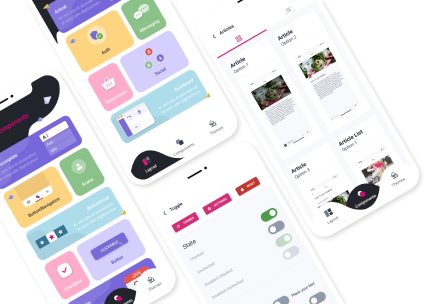What is Angular.js? A Comprehensive Guide for Beginners
Angular.js, commonly referred to as Angular, is an open-source front-end web application framework maintained by Google. It allows developers to build dynamic single-page applications (SPAs) using HTML, CSS, and JavaScript. Angular.js extends HTML's syntax to create powerful and expressive templates, making it a popular choice for building complex web applications.
How does Angular.js work?
Angular.js uses a declarative approach to build SPAs. It works by breaking down the application into modules, which are then composed of components. These components define the behavior and appearance of the UI elements, such as forms, buttons, and other interactive widgets.
The data-binding feature in Angular.js is one of its most distinctive features. It enables the synchronization between the model and view components in real-time, eliminating the need for manual DOM manipulation. This makes it easier to develop scalable, maintainable, and testable code.

Why use Angular.js?
Angular.js offers numerous benefits that make it a popular choice for web development projects. Some of these include:
- Enhanced performance: Angular.js optimizes website performance by reducing server requests and improving page loading times.
- Consistent code structure: Angular.js provides a clear structure for organizing code and modularizing functionality.
- Easy maintenance: The declarative approach in Angular.js simplifies the process of maintaining and updating large-scale applications.
- Code reusability: Angular.js allows developers to write reusable code that can be shared across different parts of the application.
- Rich set of features: Angular.js offers a rich set of features including two-way data binding, dependency injection, and routing.
Is Angular.js difficult to learn?
Like any other technology, learning Angular.js requires some time and effort. However, with the right resources and guidance, even beginners can quickly get up to speed with the framework.
Angular.js has a well-documented API and an active community of developers who contribute to its development. There are also plenty of tutorials, courses, and online resources available for beginners.
What are the key features of Angular.js?
Some of the key features of Angular.js include:
- Two-way data binding: Allows automatic synchronization between the model and view components.
- Dependency injection: Makes it easier to manage dependencies between different parts of the application.
- Directives: Extend HTML's syntax to create custom elements and attributes that can be reused throughout the application.
- Routing: Enables building single-page applications with multiple views and navigation between them.
- Testing: Angular.js provides a suite of tools for testing applications at different levels, including unit testing, integration testing, and end-to-end testing.
Conclusion
Angular.js is a versatile and powerful framework that offers numerous benefits for developing modern web applications. Its rich set of features, ease of use, and active community make it a popular choice among developers of all skill levels. Whether you're a beginner or an experienced developer, Angular.js has something to offer.
So, if you're looking to build dynamic and scalable web applications, consider giving Angular.js a try.









